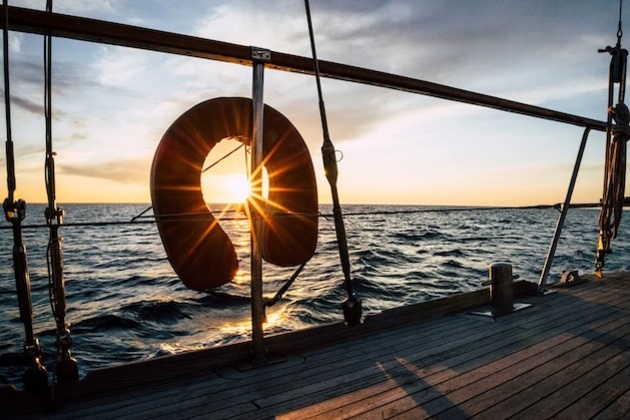Accelerating Action on Ocean Finance Crucial Particularly for Developing Countries, Minister for Foreign Affairs Stresses, at Nice Panel
Press UN
10 Jun 2025, 15:55 GMT+10

NICE, FRANCE, 10 June — The international goal to conserve and sustainably use the ocean, seas and marine resources remains the least funded among all the Sustainable Development Goals (SDGs), speakers warned during a panel discussion of the 2025 United Nations Ocean Conference today as they called for greater investment in this field.
Co-chaired by ministers of Jamaica and Iceland, this morning’s panel — the third of 10 held this week on the sidelines of the high-level debate — focused on “Mobilizing finance for ocean actions in support of Sustainable Development Goal 14”.
“Accelerating action on ocean finance is crucial, particularly for developing countries, which depend on the ocean for nutrition, livelihood, recreation and transportation”, said Kamina Johnson Smith, Minister for Foreign Affairs and Foreign Trade of Jamaica, adding that “this is especially the case” for small island developing States, as well as least developed countries. Jamaica is embarking on innovative financing schemes, including a $500 million blue green facility, which aims to attract private-sector stakeholders and investors focused on climate resilience and blue transition.
Iceland’s development has been built on the sustainable use of marine resources, guided by science and long-term thinking, said Jóhann Páll Jóhannsson, the country’s Minister for the Environment, Energy and Climate. In many cases, what is needed is primarily a redirection of existing resources, guided by evidence. “An increase in climate finance is of limited use if we do not cut massive subsidies of fossil fuels,” he said, adding: “The same applies to the ocean.” Noting an international agreement to eliminate harmful fisheries subsidies, he said: “By phasing out support that contributes to overcapacity and overfishing, and redirecting it towards sustainability and equity, we can align economic incentives with long-term ocean health.”
Setting the stage for further discussion as moderator, Karen Sack, Executive Director, Ocean Risk and Resilience Action Alliance, said that the ocean is not a victim of climate change — it is a solution — “a mispriced asset class, undervalued and underfunded, yet holding the key to food security, climate stability, biodiversity recovery and sustainable growth”. Therefore, “inaction will cost us over $8 trillion in lost opportunity”, she warned, noting that bold, coordinated action today could unlock $15.5 trillion in shared prosperity by 2030.
“Reverse the burden of proof,” said Dona Bertarelli, Executive Chair of Dona Bertarelli Philanthropy, proposing that instead of conservationists having to justify protection, exploiters must prove they caused no harm. This shift would unlock private finance and dramatically change the incentives. The biggest challenge is building the will and the capacity to scale up. “We know what works,” she said, identifying highly and fully protected marine areas as “the most effective tool”. They offer proven benefits for both nature and people: restoring biodiversity, supporting fisheries and building climate resilience. Marine protected and conserved areas will return at least $3-4 for every $1 invested. Protecting 30 per cent of the ocean could yield benefits of up to $926 billion by 2050.
Yet only 8.3 per cent of the ocean has some kind of protection with only 2.8 per cent being fully or highly protected. “Despite this evidence, the current financial flows are out of step with the scale and urgency of the challenge,” she said. Today, less than 9 per cent of biodiversity-related development finance reaches marine and coastal ecosystems. All sources combined — public, philanthropic and private — deliver less than 1 per cent of global climate and biodiversity finance to the ocean, with only $3 billion a year being spent against an estimated need of $175 billion annually to achieve SDG 14 and the ocean targets of the Global Biodiversity Framework.
One of the barriers to increasing investment is risk associated with it. “Without insurable oceans, we won’t have investable oceans”, said Ulrike Decoene, AXA Group Chief Communication, Brand and Sustainability. With 38 per cent of the global population living less than 100 kilometres from the coast, rising sea levels and deteriorating ocean health present significant risks to infrastructure, communities and economic activities. The stakes are particularly high for commercial insurers, like her company. “What is at stake for my industry is, to be very blunt, is insurability of those areas”, she said.
However, she stressed the need to seize an opportunity to build collective resilience and reduce economies’ exposure to climate risk. Insurers can play an important role in this endeavour. AXA developed the Coastal Risk Index, which revealed that $363 billion in coastal assets are at risk without natural defences and 14.2 million more people could face annual flooding without coral reefs, mangroves and wetlands. Insurers can provide data to decision makers. With expertise in risk assessment, insurers can also help de-risk investments and incentivize sustainable practices.
Mafalda Duarte, Executive Director, Green Climate Fund, described the ocean as “the Earth’s greatest climate regulator”. If the oceans had not absorbed more than 90 per cent of the excess heat from human activity and a quarter of global CO2 emissions, “we would at the moment be facing much more severe impacts of climate change than we are”, she said. Ocean-based solutions could cut 4 gigatons of emissions a year by 2030. The Fund has since 2016 committed $1.3 billion to ocean and coastal resilience and have unlocked another $1.5 billion.
As “an enabler and catalyst for other investments”, the Fund has been providing grants to over 30 countries, including for the national ocean climate frameworks in Brazil and two independent economies across 14 Pacific island nations. In Ecuador, the Fund is providing $36 million in grant financing to capitalize a perpetual fund to attract private investment in mangrove protection. In Thailand, it is financing the nation’s first blue bond supporting investments in marine tourism, agriculture and coastal waste management. In Barbados, it supported a restructuring of debt that freed up $125 million for water resilient infrastructure.
Mathias Cormann, Secretary General of the Organisation for Economic Co-operation and Development (OECD), said that if the ocean economy was a country, it would already be the world’s fifth largest economy. Over the past 25 years, the ocean economy has been contributing between 3 and 4 per cent of global gross value-added. The OECD’s Fisheries Support Estimate database shows that, of the $10.7 billion Governments spent annually on subsidies and other forms of support to fisheries between 2020 and 2022, a massive 65 per cent risks encouraging unsustainable fishing. “We have substantial amounts of public money taking us in the wrong direction”, he said.
A new OECD standard provides practical policy guidance for Governments to materially reduce the risk that subsidies and other forms of public support benefit illegal, unreported and unregulated fishing. About 80 per cent of official development assistance (ODA) in 2023 was focused on three traditional ocean economy sectors: maritime transport, ocean protection and fisheries. “There are untapped opportunities to diversify and strengthen growth in the ocean economy, including offshore renewable energy and marine biotechnology”, he said, noting that the recently launched OECD Guidance on Development Co-operation for a Sustainable Ocean Economy provides a blueprint for mobilizing effective finance for a sustainable ocean economy.
Pradeep Kurukulasuriya, Executive Secretary of the United Nations Capital Development Fund, said that “it’s impossible for us to be talking about a context where collapse of the oceans could lead to half the oxygen that we need, potentially collapsing of the insurance sector, which, if you hadn’t realized, is the first step to the collapse of banking in general”. This is a very serious time, he said, adding that the emphasis must be on the urgency.
He highlighted the use of non-ODA resources because ODA is declining in general. “It’s not going to work if we focus only on ODA”, he said. With the private sector being such an integral part of the issues, it is also important to deploy blended finance solutions, he noted, pointing out that private investment does not flow very easily. Of nearly $500 trillion worth of global assets, just 4 per cent makes it to developing countries. “This is a fraction of a fraction of a fraction”, he said, adding that the One Ocean Finance Facility aims to mobilize non-ODA resources.
 Share
Share
 Tweet
Tweet
 Share
Share
 Flip
Flip
 Email
Email
Watch latest videos
Subscribe and Follow
Get a daily dose of Jamaican Times news through our daily email, its complimentary and keeps you fully up to date with world and business news as well.
News RELEASES
Publish news of your business, community or sports group, personnel appointments, major event and more by submitting a news release to Jamaican Times.
More InformationBusiness
SectionUBS faces $26B capital demand under Swiss post-crisis plan
BERN, Switzerland: UBS faces a sweeping new capital requirement from the Swiss government, which this week proposed changes that could...
Inside the viral world of Walmart’s high-paid cake artists
NEW YORK CITY, New York: At a Walmart Supercenter in New Jersey, buttercream borders and edible-ink cartoons aren't just about sweet...
U.S. stocks directionless, although Nasdaq Composite adds 61 points
NEW YORK, New York - Wall Street delivered a split performance on Monday, with the Nasdaq Composite notching up gains while the Dow...
Kering eyes partial sale of Fifth Ave building to cut debt
NEW YORK CITY, New York: Luxury group Kering is in exclusive discussions to sell a stake in its prime New York real estate asset on...
P&G announces 7,000 job cuts in two-year global restructuring
CINCINNATI, Ohio: Facing global economic headwinds and mounting tariff pressures, Procter & Gamble announced plans this week to cut...
Tesla faces EV market pressure as May sales slide in Europe
AMSTERDAM, Netherlands: Tesla saw a sharp decline in sales across several major European markets in May, marking its fifth consecutive...
International
Sectionispace lander crashes on moon; Japan faces new lunar setback
TOKYO, Japan: Japan's hopes for a foothold in commercial lunar exploration suffered a second blow this week after Tokyo-based startup...
FSB claims Russian professors linked to British Council espionage
MOSCOW, Russia: Russia's principal security agency, the Federal Security Service (FSB), has accused British intelligence of using the...
Australian PM rejects US pressure to ease biosecurity rules
SYDNEY, Australia: Australia will not ease its strict biosecurity rules during trade talks with the United States, Prime Minister Anthony...
Flotilla ship prevented from reaching Gaza, passengers and crew detained
The Israeli Navy has intercepted a ship carrying humanitarian aid and a number of activists including Greta Thunberg, Rima Hassan,...
Japan’s 2024 birth rate drops below 700,000 for first time
TOKYO, Japan: Japan's demographic challenges intensified in 2024, with the number of births falling to another all-time low—underscoring...
China bureaucrat bottlenecks over rare earths ripple through industry
BEIJING, China: A little-known office inside China's Ministry of Commerce has become a powerful chokepoint in the global auto and tech...













